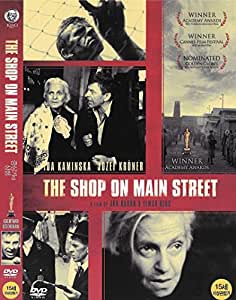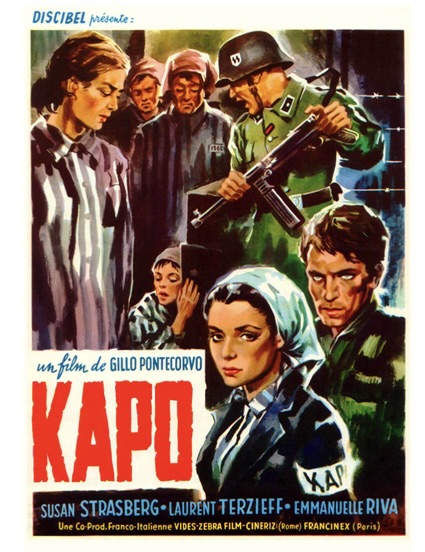Il negozio al Corso
Di Daniel Moscetta
Scritto da Ladislav Grosman e diretto da Ján Kadár e Elmar Klos il filem è stato girato nella città di Ha. Protagonisti: Jozef Kroner nel ruolo del falegname slovacco Tóno Brtko e la leggendaria attrice polacca Ida Kamińska nel ruolo della vedova ebrea Rozália Lautmannová. Nel 1965 vinse l’Oscar come miglior film straniero, e Ida Kamińska un anno dopo fu nominata miglior attrice protagonista. Nello stesso anno fu presentato al Festival di Cannes.
È considerato uno dei film più memorabili sulla Shoah. Meraviglioso, molto molto toccante. Brillantemente recitato.
Durante la Seconda guerra mondiale in una piccola città della Prima Repubblica Slovacca (stato collaborazionista della Germania nazista), il mite falegname slovacco Antonín “Tóno” Brtko viene scelto da suo cognato, che ha una posizione influente nel governo fascista locale, per rilevare il negozio di nozioni di cucito e merceria di proprietà dell’anziana vedova ebrea Rozália Lautmannová, come parte degli sforzi di arianizzazione nel paese.
Brtko fatica a spiegare all’anziana Lautmannová, quasi sorda e confusa, la nuova situazione. Lascia che sia lei a continuare a gestire il negozio, passando la maggior parte del tempo a sistemare i suoi mobili o cercando inutilmente di aiutarla con i clienti. E così la strana coppia inizia a sviluppare una stretta relazione. Quando Brtko sente che le autorità stanno per radunare i cittadini ebrei della città per portarli altrove in massa, non lo dice a Lautmannová. In un primo momento matura l’idea di nasconderla, ma sotto l’effetto dell’alcol perde i nervi e tenta di persuaderla a unirsi agli altri ebrei in strada. Lei capisce che si tratta di un pogrom e va nel panico. Ma nel tentare di acciuffarla nel negozio per trascinarla in strada, come stava accadendo a tanti altri suoi vicini ebrei, Brtko subito se ne vergogna. E non appena vede alcuni soldati dirigersi verso il negozio la nasconde in un armadio, nel tentativo di salvarla dai militari, che poco dopo si allontanano. Allora Brtko apre la porta dell’armadio, ma scopre che l’anziana Lautmannová è morta. Devastato dal tragico evento si impicca. Il film termina con una sequenza onirica: Lautmannová e Brtko corrono e ballano per la piazza della città.
Focalizzando questa storia su due protagonisti il film narra di una storia umana, che racchiude in sé la tragedia di quei fatti storici negli occhi vitrei di un’anziana commerciante. Un film poetico e struggente.
Attraverso le magnifiche interpretazioni di Kroner e Kaminska, una star del teatro yiddish nata a Odessa, il film raggiunge grandi vette mostrando come la persona comune venga coinvolta nei conflitti del suo tempo e si blocca cercando di fare le scelte giuste.




SCHEDA DEL FILM
Paese di origine: Cecoslovacchia
Anno: 1965
Regia: Ján Kadár e Elmar Klos
Cast: Ida Kamińska, Jozef Kroner
Note: Tratto dal racconto di Ladislav Grosman “La Trappola” (1962)
Come vederlo: Il DVD di questo film è in vendita su Amazon
Di origine greche, italiano-americano, Daniel Moscetta è membro associato di Beth Hillel Roma. Appassionato di cinema è cultore di storia e critica del film.
The Shop on Main Street
By Daniel Moscetta
The film was written by Ladislav Grosman and directed by Ján Kadár and Elmar Klos. It was filmed with a Slovak cast on location in the town of It stars Jozef Kroner as the Slovak carpenter Tóno Brtko and legendary Polish actress Ida Kamińska as the Jewish widow Rozália Lautmannová.
The film won the 1965 Academy Award for Best Foreign Language Film, and Kamińska was nominated one year later for Best Actress in a Leading Role. It was entered into the 1965 Cannes Film Festival.
It is considered one of the most memorable films about the Shoah. A gorgeous film, very very touching and poetic. Brilliantly acted.
During World War II in a small town in the First Slovak Republic (a client state of Nazi Germany), mild-mannered Slovak carpenter Antonín “Tóno” Brtko is chosen by his brother-in-law, who holds an influential position in the local fascist government, to take over the sewing notions shop owned by the elderly Jewish widow Rozália Lautmannová as part of the Aryanization efforts in the country. Brtko struggles to explain to Lautmannová, who is nearly deaf and generally confused, the outside world and that he is now her supervisor.
Brtko lets Lautmannová continue to run things in her shop, spending most of his time fixing her furniture or ineptly trying to assist her with customers, and the pair begin to develop a close relationship. When he hears that the authorities are going to gather the Jewish citizenry of the town and transport them elsewhere en masse, he does not tell Lautmannová and at first considers hiding her. Drinking steadily, he eventually loses his nerve and attempts to cajole and then force Lautmannová to join her friends in the street. She finally recognizes that a pogrom is happening and panics. Brtko chases her around inside the shop, but he stops and feels ashamed of himself after he witnesses his other Jewish neighbors actually being carted away. Seeing some soldiers heading toward the shop, he throws Lautmannová, who is in a frenzy, into a closet to hide her. The soldiers just glance in the window and keep walking. When Brtko opens the closet door, he discovers Lautmannová’s dead body,[a] and, devastated, hangs himself. The movie ends with a fantasy sequence in which the now deceased Lautmannová and Brtko run and dance through the town square together.
By studying the Holocaust through only a few people and not on a large scale, it puts on it a human face.
Through the magnificent performances of Kroner and Kaminska, a star in the Yiddish theater who was born in Odessa, the film reaches great heights by showing how the ordinary person gets caught up in the conflicts of his time and is stuck trying to make the right choices. The pathetic carpenter, a Christian who just wants to be left alone to play with his dog and work with wood, becomes so confused when things are out of his control, that he’s not sure at the end if he’s capable of doing the morally right thing or of even knowing his own identity.
Technical sheet of the film:Country: Czechoslovakia
Release date: 1965
Directed by Ján Kadár and Elmar Klos
Starring: Ida Kamińska Jozef Kroner
Notes: Based on Ladislav Grosman’s short story “The Trap” (1962)
How to watch it: The DVD of this movie is on sale on Amazon




